
|
Greatest Scariest K-L |
| Movie Title/Year and Brief Scene Description | ||||||||||||||||||||||||

|
Kill Bill, Vol. 2 (2004) The scariest scene in this
second installment of Quentin Tarantino's crime thriller was of
the live burial of the revenge-seeking Bride (Uma Thurman) by Bill's
(David Carradine) degenerate brother Budd (Michael Madsen). During part of the burial, the Bride was able to switch on a flashlight, although much of the horror of the scene was in the dark, as she realized she was about to die. However, she positioned the flashlight so she could see, released the tight bindings, and punched her way through the side of the coffin - recalling her training by martial arts master Pai Mei (Gordon Liu), and crawled through the dirt to the surface, where she gasped for air. In the next scene, the Bride's next target, Elle Driver (Daryl Hannah) congratulated Budd on 'killing' the Bride: "That's a pretty f--ked up way to die." |
   Buried Alive in Coffin |
||||||||||||||||||||||
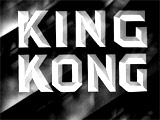
|
Merian C. Cooper's and Ernest B. Schoedsack's classic monster film was a monumental achievement in story-telling and visual special effects. In an early scene set in a NYC Bowery restaurant, foolish director/explorer and adventuring film-maker Carl Denham (Robert Armstrong) had just rescued a starving young girl named Ann Darrow (Fay Wray). He offered the down-and-out, destitute woman a job with the enticing promise:
She agreed to join Denham's six-week mission to the South Pacific, to the uncharted Skull Island. Enroute, the blonde starlet Ann was trained to scream realistically, as she wore a sexy off-the-shoulder "Beauty and Beast costume"; First Mate crew-member Jack/John Driscoll (Bruce Cabot) ominously commented: "What's he think she's really gonna see?"
The first view of Kong must have startled early audiences. The creature crashed through the jungle to arrive at the temple gates - accompanied by native chanting and music - Ann screamed for her life while offered as a tied-down bridal sacrifice - The Bride of Kong.
A few of the scenes in the original film were considered too horrific so they were censored from early prints (but later restored) - they included the sights of Skull Island natives being killed by the awesome and enraged beast Kong, who had broken through from behind an enormous wall. One hapless spear-throwing native was grabbed and chewed, while two others were stomped to death in the mud. One of the film's most thrilling and scary sequences was in the climax atop of the Empire State Building, where Ann Darrow (Fay Wray) was held in the giant hand of the Beast while dangling in mid-air, as he was shot at by biplanes. His battle against the biplanes was futile. Kong flinched as machine gun bullets ripped into his body. Kong sent one careless pilot to a fiery death. After a merciless attack, Kong loosened his hold from the building, and silently plunged many stories to his death on the street below.
|
  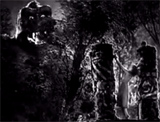 First Views of Kong  Native Chewed Up in Kong's Mouth  Native Stomped to Death |
||||||||||||||||||||||

|
#8 This fourth film of the Dead series, a comeback zombie film for director George A. Romero, posited the apocalyptic collapse of human society. It was a symbolic 'haves & have-nots' class-struggle story with prototypical characters. The masses of poverty-stricken, exploited residents in Pittsburgh, Pennsylvania were forced to live in the empty, embattled streets. Although protected by mercenaries, society was overrun by recently-dead zombies or undead "walkers" nicknamed "stenches" who were "practicing to be alive." Meanwhile, the elite lived in a fortified walled-off city known as Fiddler's Green, bordered on three sides by rivers and lorded over by Paul Kaufman (Dennis Hopper), a rich and powerful feudal overlord and opportunistic super-capitalist. Although it was an unsubtle film, it presented the idea that the zombies, led by smartly-evolved and more advanced "Big Daddy" (Eugene Clark), could become revolutionaries. They could be trained to shoot guns, use tools as weapons, and besiege the corrupt city. They were portrayed as more human than the humans: "They're just looking for a place to go." It opened with the subtitle: "SOME TIME AGO" - under the credits, radio reports (voice-over) were heard describing the apocalyptic collapse of human society and its consequences (society overrun by zombies), accompanied by jerky, black and white images. The well-organized horde of hundreds of zombies were led by zombified gas station attendant "Big Daddy" who demonstrated to his fellow zombies, in the film's most terrifying scene, that they could cross the river into the city without drowning by walking on the riverbed bottom under the water. The zombies crashed through the front doors of the insular, high-rise Fiddler's Green skyscraper of the wealthy, and invaded the walled and fortified mall area, while scheming coward Paul Kaufman attempted to escape with his money. |
 "Big Daddy" (Eugene Clark)  
Zombies Crashing Into Fiddler's Green |
||||||||||||||||||||||

|
The Last House on the Left (1972) #50 This taboo-breaking and often revolting 'snuff'-type film from Wes Craven was a loose remake of Ingmar Bergman's Oscar-winning The Virgin Spring (1960, Swe.). A toned-down version of the film was remade in 2009 by director Dennis Iliadis, with Craven as producer. It told about the long and upsetting ordeal of two teenaged girls who were raped and tortured in backwoods - including chest-carving with a knife, forced lesbian sex and disembowelment (with bloody intestines pulled out):
They were searching for pot when kidnapped on their way to a Blood Lust rock concert by a sadistic group of escaped convicts led by Krug Stillo (David Hess). In one disturbing scene after they were taken to a woodsy area, blue-wearing Phyllis was forced to urinate with her clothes on ("Piss (in) your pants...Do it!"). The camera panned down, showing her wettened blue-jeans. Then, they were stripped naked and forced to have oral sex with each other ("Make them make it with each other!"). The girls went ahead, rationalizing: "lt's just you and me here. Nobody else. Just you and me, okay?" Psychopathic, sadistic gang member Sadie (Jeramie Rain) also performed oral sex on Mari. Phyllis made a run for it, but was cornered, stabbed in the back by Fred "Weasel" Podowski (Fred Lincoln) and then dis-emboweled (after repeated stabbings) and butchered, after which psychopathic, sadistic gang member Sadie reached in and pulled out her gooey intestines to examine them. Phyllis' hand and half of her forearm were amputated (off-screen). Meanwhile, red-wearing Mari was next - she had Krug's name carved into her upper chest and was then brutally raped (as he drooled onto her face). She vomited and then walked dazedly into a nearby pond to half-submerge and cleanse herself. Krug shot and killed her there, and she floated on the water's surface.
This ugly scene was intercut with views of 'surprise party' preparations for Mari by her parents John and Estelle Collingwood (Gaylord St. James and Cynthia Carr). Ironically, in a later scene, the escaped convicts took refuge in the home of the upscale small-town parents, the hospitable Collingwoods - where there was animalistic payback revenge/slaughter of the gang.
In grotesque sequences of ultra-violent revenge, the father semi-electrocuted Krug, chipped out his teeth out with a chisel (in a dream sequence) and pursued him with a chainsaw and killed him (off-screen, evidenced by blood splatter). Meanwhile outdoors, the mother cleverly enticed gang member "Weasel" to have sex (she had also convinced him to have his hands tied behind his back) - he told her: "Now you just unzip me, and that's all l'll need you for." At first, he became caught in his zipper and he was unresponsive, but then she touched him more and more. She sank down to crotch-height, and as he was climaxing, she viciously dismembered him. After returning home, she fought off Sadie with a knife, and then was able to slash her throat with the weapon in the pool. |
 Mari and Phyllis  Phyllis Ordered to Pee In Her Pants 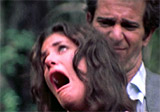   Phyllis Stabbed in Back and Disemboweled; Left Hand Amputated  Weasel Fooled by the Mother  Sadie Slashed to Death with Knife in Pool |
||||||||||||||||||||||

|
The Last King of Scotland (2006, UK/Germ.) An awful torture-death scene demonstrated one of the many brutal actions of Ugandan dictator Idi Amin (Forest Whitaker) in the 1970s. Idi Amin's young Scottish physician Dr. Nicholas Garrigan (James McAvoy) was punished (for an attempted poisoning after realizing the enormous inhumanity of Amin's regime) by being dangled from the ceiling by ropes and left to die - hanging by two meat hooks pierced through his chest's nipples - although he was eventually rescued.
|
  Dr. Garrigan's Torture by Hanging From Meat Hooks |
||||||||||||||||||||||
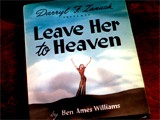
|
In this Technicolored film noir thriller by director John M. Stahl, one of the film's most chilling scenes was performed by the archetypal femme fatale: Ellen Berent/Harland (Oscar-nominated Gene Tierney) - a neurotically-possessive, insanely-jealous, and darkly alluring female. The beautiful socialite Ellen captivated and married 30 year-old bachelor and author-writer Richard "Dick" Harland (Cornel Wilde). Then, she vowed that she would stop at nothing to make the man she loved her exclusive possession:
Soon after when her behavior became extreme, she apologized for her obsession in him:
In the film's frightening murder scene orchestrated by Ellen, she was calmly watching from a rowboat as her novelist husband Richard's younger paraplegic brother Danny (Darryl Hickman) (and her own brother-in-law) tired and drowned in the Maine lake directly in front of her, on a bright and sunny day. She registered no reaction on her passive, heartless face as he sank below the water and never reappeared. |
    The Deliberate Drowning of Paraplegic Danny |
||||||||||||||||||||||

|
The Leopard Man (1943) In Jacques Tourneur's and RKO's noirish, and shadowy horror-thriller, the low-budget effort was taglined and described as one of the first serial killer films:
It was the third of Tourneur's horror films produced by Val Lewton, following:
The story was set in a Mexican border town in New Mexico, where a rented tame black leopard was acquired from Indian sideshow performer and traveling zoo owner Charlie How-Come (aka The Leopard Man) (Abner Biberman). The animal was used as a PR stunt in a nightclub act by manager/publicist Jerry Manning (Dennis O'Keefe) for his girlfriend Kiki Walker (Jean Brooks). After Kiki made a startling entrance with the black cat, her exotic, castanet-flamenco-dancer rival Clo-Clo (Margo) deliberately frightened and spooked the leashed animal with her castanets during her performance. Her behavior caused the creature to become spooked - it hissed, tugged on its leash, and fled through an open door. Soon after, there was a terrifying, upsetting and truly frightening night stalking sequence. Teenaged neighbor Teresa Delgado (Margaret Landry) was sent out by her impatient and scolding mother to buy corn-meal for her father's meal of tortillas, even though an escaped leopard was reported on the loose. With the nearest store closed, she had to cross town and enter a dusty arroyo (with the wind tossing around a tumbleweed) to another shop where the shopkeeper noted: "Now I remember the little girl who was afraid of the dark" - she responded: "I'm not afraid, what could happen to me?"
As Teresa returned home with the bundle of cornmeal grasped to her body, she heard the sound of dripping water, saw two gleaming eyes under a railway trestle, and was startled by the noise of a speeding train that roared above her (with a screaming whistle). And then she saw the snarling, growling leopard (viewed in close-up) that began chasing after her. When she raced to the door of her home, her exasperated mother kept the door locked on her (and the lock jammed) as she desperately pounded on it and begged to be let in:
The mother thought that she was faking a lethal leopard attack as an excuse for returning home late (her death was off-screen with blood-curdling screams, and a slow flow of blood seeping under the door). In the ending, a discovery and sleuthing sequence was set up to capture the real compulsive serial killer, who had committed the additional attacks to make it appear that the leopard was the killer; the killer was Indian museum curator and animal expert Doctor Galbraith (James Bell), who had turned murderous after becoming excited by the initial leopard attack. |
 Clo-Clo's Castanet-Dance Nightclub Act   Kiki Walker's Nightclub Appearance with a Leopard to Upstage Her Rival Clo-Clo   Kiki's Rival Clo-Clo Spooking the Leopard with Castanets |
||||||||||||||||||||||

|
Director Richard Donner's first film in the action-crime film franchise starred Mel Gibson as Sgt. Martin Riggs, a 37-year old LAPD Narcotics cop with suicidal tendencies (harmful to himself and to others). He had recently suffered the accidental car death of his 31 year-old wife Victoria Lynn after 11 years of marriage. Riggs was taken as a hostage by albino villain Mr. Joshua (Gary Busey) and his Chinese henchman Endo (Al Leong). During a shower electrocution torture scene, Riggs was strung-up half-naked, doused in water, and prodded in his bare torso with an electric sponge attached to a car battery. During the torture, the bad guys demanded to know what the cops knew about a heroin drug "shipment." |
 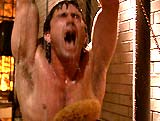
Shower Electrocution Torture Scene |
||||||||||||||||||||||

|
Let's Scare Jessica to Death (1971) Director/co-writer John Hancock's creepy, low-key psychological shocker about insanity (his feature film debut) was one of the best (but underrated) horror films of all-time. The eerie low-budget movie, in a post-Manson era, gave away some of its scary vampire plot with the tagline:
In the opening dream-like image (a bookend to the film's ending), a silhouetted female sat in a boat that drifted in the morning mist, with an orange sunrise. An internal female-voiced monologue confessed uncertainty about what was real or not:
Recently-released mental patient Jessica (Zohra Lambert), after six months of therapy in an institution, moved from NYC (in a converted hearse under the title credits) into an isolated, tall, 100 year-old white New England farmhouse (with an orchard) on Brookfield Island (Connecticut). The emotionally-fragile and unstable ex-patient Jessica was accompanied by her balding, symphony bass-playing husband Duncan (Barton Heyman) and long-haired, mustached hippie friend Woody (Kevin O'Connor). Red-headed, homeless, lute-playing bohemian Emily (Mariclare Costello) was found living in the seemingly-abandoned house, and was invited to stay on. Many strange visions, ghostly sounds and occurrences began to threaten Jessica's sanity:
The town's antique dealer Sam Dorker (Alan Manson) of "The Black Whale", another ex-New Yorker, explained the family history of their farmhouse's previous owners pictured in an old portrait found in their attic - The Bishops. Dorker was reluctant to buy Bishop family heirlooms from them, but offered to take the whole lot for $250. According to Sam, daughter Abigail (who bore a striking resemblance to Emily - and was played by the same actress) drowned in 1880 in the cove just behind the house before her wedding: ("Abigail never got to wear that wedding dress"). He called it an "extraordinary" story ("Never found her body. The legend is that she's still alive. Some say she's a vampire and roams the countryside"). Other frightening things occurred:
Toward the film's escalating conclusion during a nightmarish daze, Jessica saw the knife-wielding Emily leading the elderly (and hungry) male townsfolk into her bedroom to cut her and suck blood from her neck. As Jessica fled downstairs, she tripped over Duncan's bass instrument case that contained the blonde Girl's corpse with a bloody neck wound. She also found Woody's corpse (with a slit throat) sitting on a moving tractor in the orchard. The next morning, as Jessica attempted to escape with a stolen rowboat, a hand from a submerged body in the middle of the lake reached out to the side of the boat. After bludgeoning and slashing away at the assailant's back with a fishing hook, Jessica realized, after the body slowly turned over in the water, that she had accidentally killed Duncan.
The film ended ambiguously with Jessica's voice-over musings (similar to the film's prologue), as she looked to the edge of the shore where Emily and the townsfolk watched after her:
|
 Opening Voice-Over Monologue  Jessica (Zohra Lambert)  "Jessica, come to me"  The Bishop Family Portrait  Abigail Bishop's Tombstone  Sam Dorker's Body?  Mute Blonde Girl (Gretchen Corbett)  Portrait Again Hanging in Attic    Swim with Emily and Jessica's Threatened Drowning   Attack on Jessica in Bedroom  Duncan's Bloodied Body |
||||||||||||||||||||||
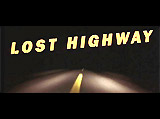
|
This intriguing, non-linear David Lynch psychological thriller, with film-noirish characteristics, was extremely enigmatic and plot-twisting. It was enhanced with an Angelo Badalamenti-Trent Reznor soundtrack. It told about a hip LA couple:
In the scariest and eeriest scene, a Mystery Man (Robert Blake), a no-eyebrowed, creepy, evil individual with white makeup and a puffy, pasty face, came up to Fred at a pool party at Andy's house and announced that they had met before - at Fred's house: "We've met before, haven't we?...At your house, don't you remember?" And then he added:
He claimed that he was standing in Fred's house, miles away, at that very moment. Fred was freaked out: "That's f--king crazy." The Mystery Man pulled out his phone, handed it to Fred, and challenged him: "Call me. Dial your number. Go ahead." When Fred dialed his home, the man answered: "I told you I was here."
Fred was quietly astounded: "How'd you do that?" He was urged to ask on the phone. He continued: "How'd you get inside my house?" The man answered: "You invited me. It is not my custom to go where I'm not wanted." When Fred asked: "Who are you?" both the man in front of him and the man on the phone answered, in unison, with an ominous laugh and smile. The voice on the phone then instructed: "Give me back my phone." The strange conversation ended with the Mystery Man's last words before turning and walking away:
|
 The Mystery Man (Robert Blake) at Party  Mystery Man To Fred: "We've Met Before, Haven't We?"  Ominous Laugh and Smile (On both the Phone and in Person) |
||||||||||||||||||||||
(alphabetical by film title, illustrated) Intro | #s-A | B | C-1 | C-2 | D-1 | D-2 | E | F | G | H I-J | K-L | M | N-O | P | Q-R | S-1 | S-2 | S-3 | T | U-Z |